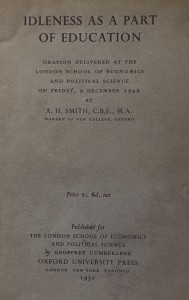Found- a thin booklet, the text of a lecture (‘oration’) on idleness  delivered at the London School of Economics in December 1949 by A.H. Smith, the warden of new College Oxford. A.H. Smith (Alic) has a short entry at Wikipedia, his dates are 1883 to 1958. Not one of the famous New College wardens like Maurice Bowra or his predecessor the historian H.A.L. Fisher but known as a philosopher and also as the Vice Chancellor at Oxford. His lecture is on a subject that is still discussed, especially in these hectic, time-poor days. However he refers to his own time as one of fast change, restlessness and impending catastrophe.
delivered at the London School of Economics in December 1949 by A.H. Smith, the warden of new College Oxford. A.H. Smith (Alic) has a short entry at Wikipedia, his dates are 1883 to 1958. Not one of the famous New College wardens like Maurice Bowra or his predecessor the historian H.A.L. Fisher but known as a philosopher and also as the Vice Chancellor at Oxford. His lecture is on a subject that is still discussed, especially in these hectic, time-poor days. However he refers to his own time as one of fast change, restlessness and impending catastrophe.
In 1932 Bertrand Russell had written In Praise of Idleness advocating a three-day week and noting ‘.. immense harm is caused by the belief that work is virtuous’, earlier Kierkegaard had written’..far from idleness as being the root of all evil, it is rather the only true good.’ In our time the industrious Tom Hodgkinson published How to Be Idle: A Loafer’s Manifesto and founded (or revived) The Idler. Smith states that by idleness he does not mean being a total slacker or waster, also he does not mean playing lots of sport, joining multiple student societies and general not studying. He is an advocate of strenuous study but of knowing when to stop, not overdoing it ‘… when you close your books, close them with a bang, and abandon yourself to the enjoyment of idleness..’
His conception of idlenees is one of contemplation and uninterrupted reverie. He mentions the ‘person from Porlock’ who interrupted Coleridge’s composition of Kubla Khan – a poem remembered from a dream. He says of of Newton ‘.. is it absurd to have the fancy that when Newton heard the apple drop he was not thinking of mathematics or physics but had abandoned himself to the dreaming state induced by the mellow light of autumnal orchards? What is essential is that there should be no hurry nor violence nor noise. When you walk in the quiet country let it sometimes be alone or with a companion with whom it is not necessary to converse. I hope that the advice which I’m giving you does not seem to be strange. But I fear that in the tempo of our times we tend less to seek the occasion for these modes of contemplation than once we did…’
He then talks of the pre WW1 Georgian poets like De la Mare and W.H. Davies who wrote much on this theme. He quotes Davies’s best known poem ‘Leisure’ (‘it might be the text of my talk’)
What is this life if, full of care,
We have no time to stand and stare.
No time to stand beneath the boughs
And stare as long as sheep or cows.
No time to see, when woods we pass,
Where squirrels hide their nuts in grass.
No time to see, in broad daylight,
Streams full of stars, like skies at night.
No time to turn at Beauty’s glance,
And watch her feet, how they can dance.
No time to wait till her mouth can
Enrich that smile her eyes began.
A poor life this if, full of care,
We have no time to stand and stare.
He ends by mentioning Porlock again:
Coleridge lost his dream through the arrival of the person on business from Porlock. Though the dream was over when he arrived, the intruder may stand as a symbol of all that interferes with the precious mood of contemplative idleness – business, politics, examinations distant or impending, social engagements, amusement, even the claims of philanthropy or friendship. All these intrusive demands are hard to resist. Nevertheless, I beg of you that, when from time to time you feel yourselves drawn to the idleness which I have spoken, you will summon all your resolution, set your faces, and repel the intrusion of the person on business from Porlock.
The short pamphlet is inscribed to ‘my former pupil’ Theo Zinn teacher, polymath, bibliophile, punster, classicist and, possibly, himself an idler.

Superb stuff, as ever.
I have an original copy of this leaflet and treasure it as much as I do its thesis.